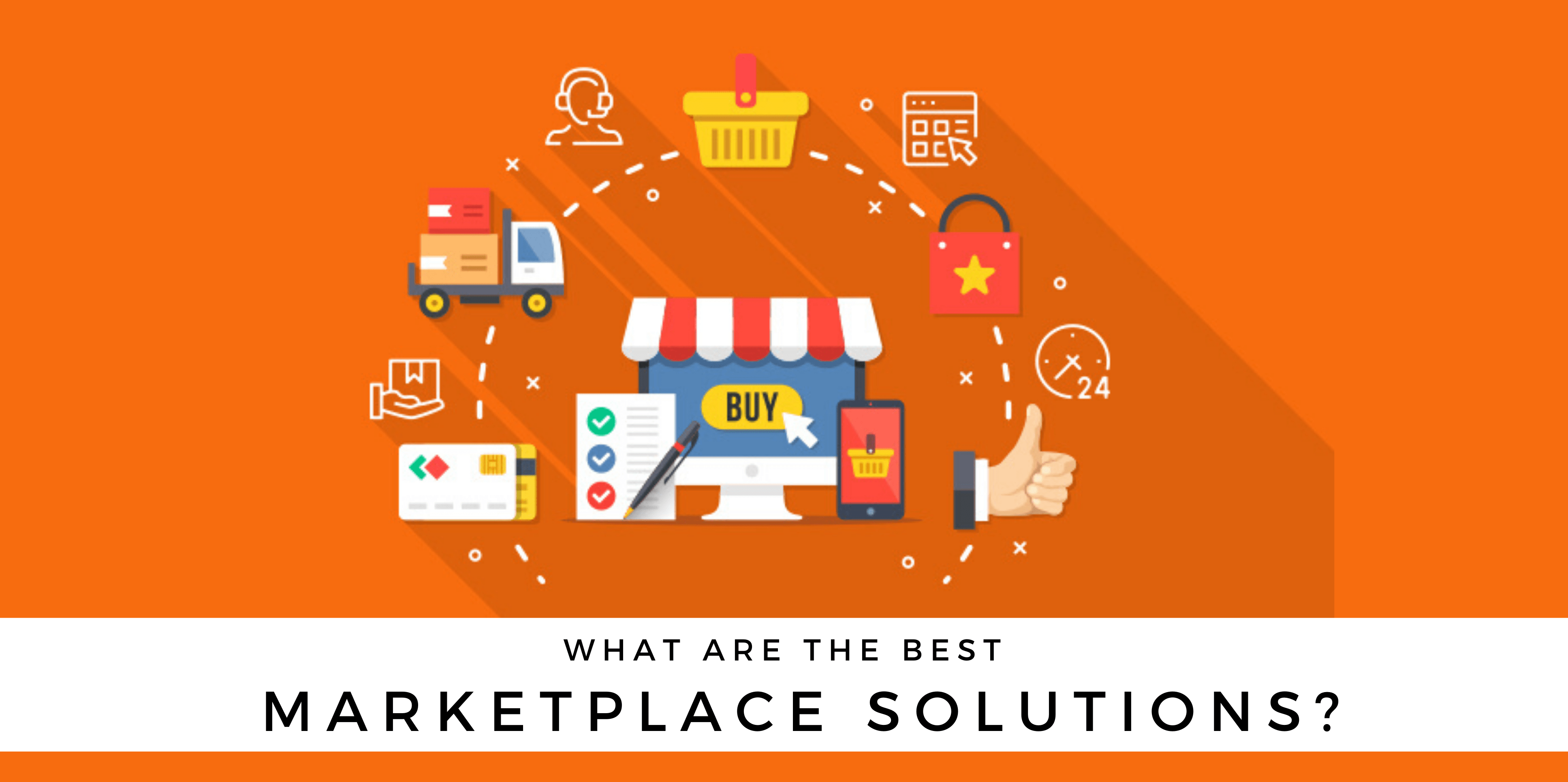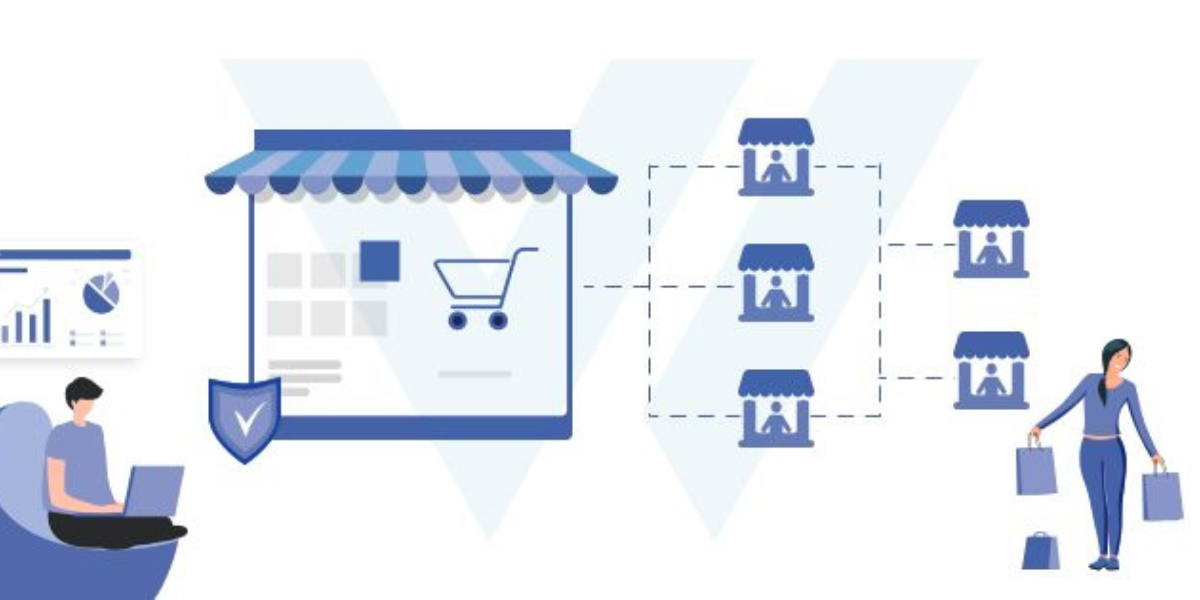Top Marketplace Business Models to Invest in 2024 and Steps to Launch One
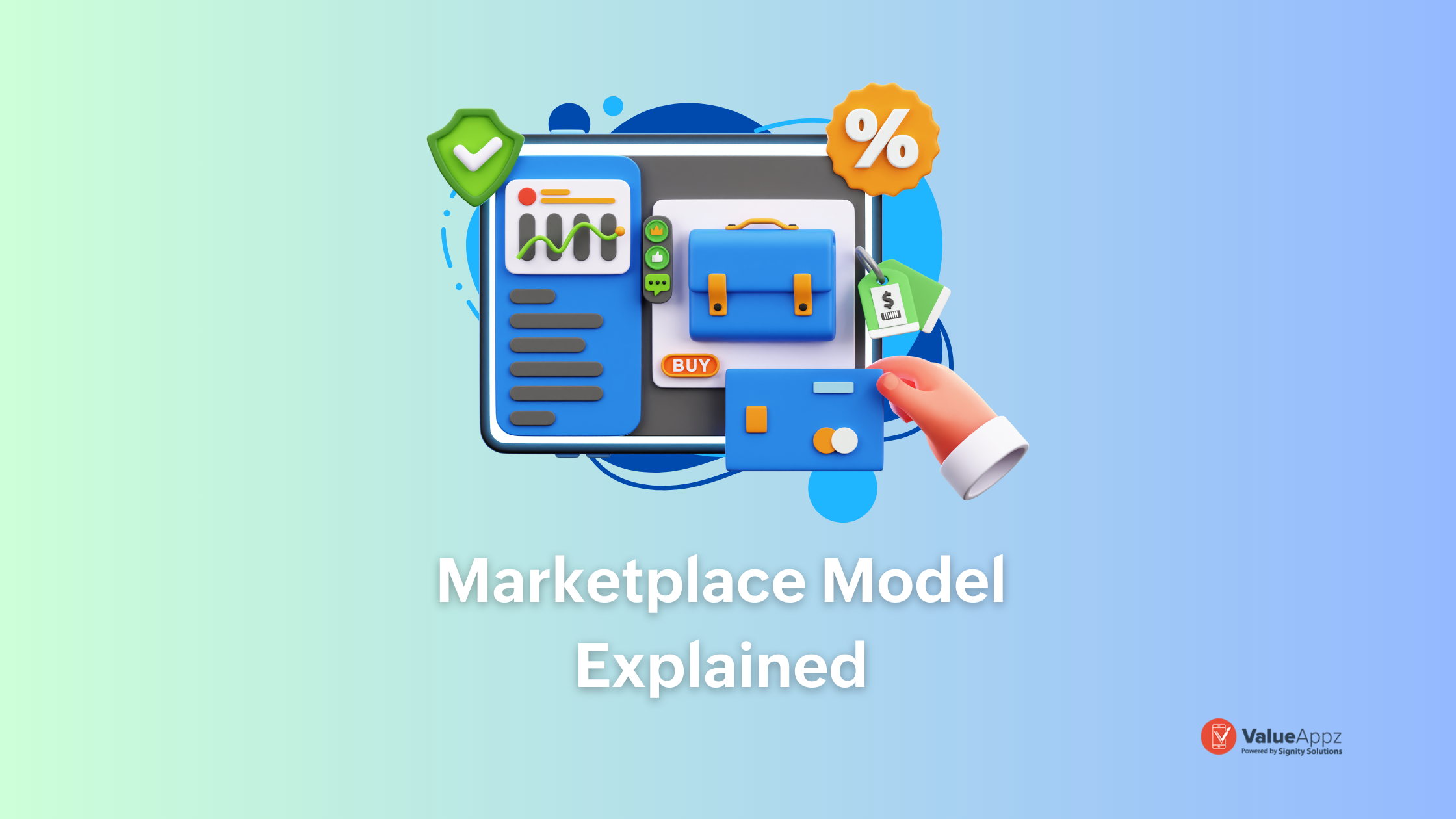
Quick Summary: Marketplace business model examples like Amazon, eBay, and Walmart are known to all. If you are willing to build a similar platform, you must have in-depth knowledge about the types, steps, and reasons why you should invest in it. Our blog focuses on answering all the questions related to marketplace business models.
Marketplace models have transformed the way people shop while providing them with the utmost convenience. The year 2024 promises great opportunities for startups and entrepreneurs to invest in the right marketplace business models and engage with the global audience.
But choosing the marketplace model is only the first step. How will you measure your success? Revenue is one of the biggest aspects to consider. Take Amazon, for example. They are the top brand in this industry, generating a daily sales revenue of an incredible $1.4 billion (Source: Jungle Socut). And let’s not forget Walmart, another major player in the marketplace industry. According to Statista, they generated a revenue of $606 billion in 2023, making them one of the largest retailers globally.
As a businessman wanting to enter this market, you need to make very careful decisions. From choosing the right platform to revenue models, target audience, etc., the process includes several steps.
Are you already aware of the marketplace business model but need guidance on which marketplace model to invest in? Look no further! At ValueAppz, we specialize in identifying the perfect marketplace solutions that align with your business goals. Take advantage of the booming marketplace landscape by connecting with us today.
Now moving back, this blog will help you understand types of marketplace models, reasons to invest, and steps to build an online marketplace business model. So, let’s get through a quick introduction to marketplace business model.
Table of Contents
What is a Marketplace Business Model?
Before we move to the types of marketplace models, it is essential to know what a marketplace model is. Simply put, a marketplace is a platform or website where buyers and sellers can meet and exchange goods and services.
It can include physical goods or digital products and can take place through online auctions, fixed-price sales, or other means of exchange. Some examples of successful marketplaces include Amazon, eBay, and Etsy.
The marketplace is in so much demand that B2C marketplaces are estimated to reach $3.5 trillion in sales by 2024. Talking of online marketplaces, it is unlike any other business as it does not produce or resell anything. Another key difference is that it targets two completely different users: buyers and sellers.
Now that you know what online marketplace business models are, let’s look at their different types.
Types of Marketplace Models to Invest In
Want to invest already? But what type of marketplace model should you choose for your brand? Understanding the various types of marketplace solutions can be confusing due to so many different forms. We have categorized these to make it easier for you to understand.
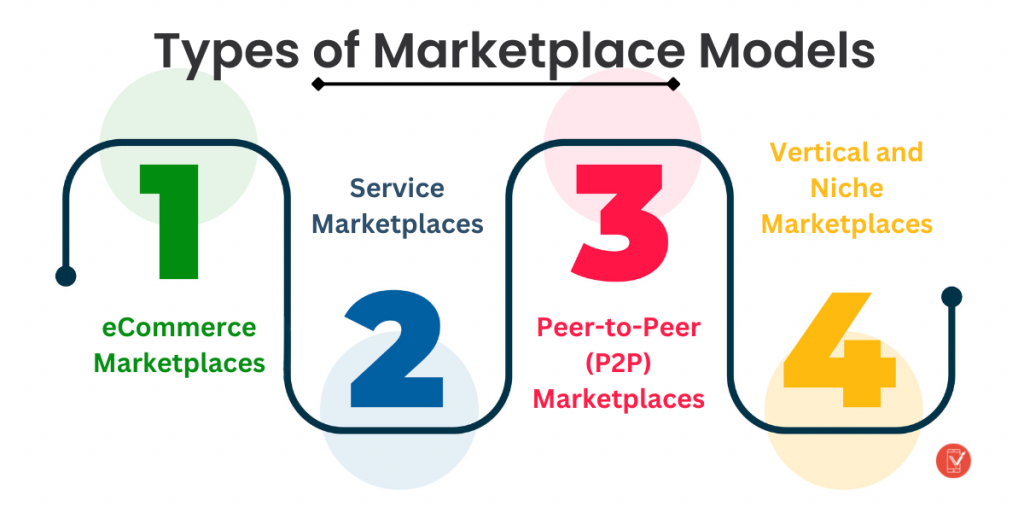
1. eCommerce Marketplaces
E-commerce Marketplaces are online platforms that make buying and selling goods and services easier. They link buyers and sellers while offering a wide choice of goods and services. The different types of eCommerce marketplaces include:
→ B2C (Business-to-Consumer)
B2C e-commerce platforms are the most popular and directly connect companies with specific customers. Well-known merchants, small enterprises, and even manufacturers sell their goods or provide their services in these markets. Customers can shop from the comfort of their homes for a wide range of products, including electronics, clothing, books, and food.
The global B2C eCommerce market size is expected to reach US$ 7.45 trillion by 2030.
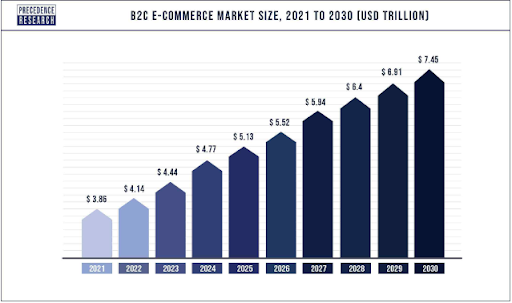
Source: Precedence Research
These online markets frequently include practical features like customer feedback, product suggestions, and safe payment methods. They now play a crucial role in contemporary retail, influencing how consumers shop for both necessities and luxuries. The most popular b2c ecommerce marketplaces are:
- Amazon
- eBay
- Walmart.com
- Etsy
- Target.com
→ C2C (Consumer-to-Consumer)
On the other hand, C2C e-commerce marketplaces enable people to conduct business with one another. In essence, these platforms serve as online markets where anyone may advertise goods they want to sell, whether new or old, to a larger audience. With features like seller ratings and feedback playing a significant role in establishing credibility, this approach is noted for encouraging a sense of community and trust among users.
In 2022, C2C accounted for about a quarter of China’s online retail sales. C2C marketplaces offer a wide range of goods, including vintage jewelry, handcrafted goods, and used clothing and electronics. Through peer-to-peer transactions, they provide a method for people to organize their houses, find great deals, or learn about rare objects.
- Facebook Marketplace
- Craigslist
- OfferUp
- Poshmark
- Depop
→ B2B (Business-to-Business)
B2B e-commerce marketplaces are tailored for companies looking to source the goods or services they require for their operations. These platforms play a critical role in expediting the process of purchasing by helping companies locate suppliers, negotiate contracts, and quickly place large orders. As per the reports, B2B eCommerce will reach 3 trillion dollars in the US by 2027.
B2B markets frequently concentrate on particular sectors or verticals, such as office supplies, medical supplies, or manufacturing equipment.
They offer services like bulk discounts, personalized catalogs, and interaction with procurement software to make purchasing easier for businesses. B2B marketplaces are essential to supply chain management because they assist companies in locating the goods and services they need to run efficiently.
- Alibaba
- Amazon Business
- eBay Business & Industrial
- ThomasNet
- Global Sources
🌐 Empower Your Business with B2B eCommerce! 📦
Join Leading Platforms like Alibaba and Amazon Business by 🚀Launching Your Own B2B Marketplace to Streamline Procurement Effortlessly. For more information, get in touch today.
2. Service Marketplaces
Service marketplaces link service providers with clients looking for certain services. They fall into two main categories: platforms for the gig economy and freelancing, which facilitate project-based labor, and platforms for making reservations and reserving services like lodging, meals, and personal services.
These markets make it simpler for customers to access and deliver various services since they give convenient choices and frequently handle transaction logistics.
→ Platforms for the Freelance and Gig Economies
Platforms for the freelance and gig economies act as online marketplaces that link people or companies needing particular services with freelancers or gig workers willing to offer their services. As the nature of work changes to become more project-based and remote, these platforms have grown in popularity.
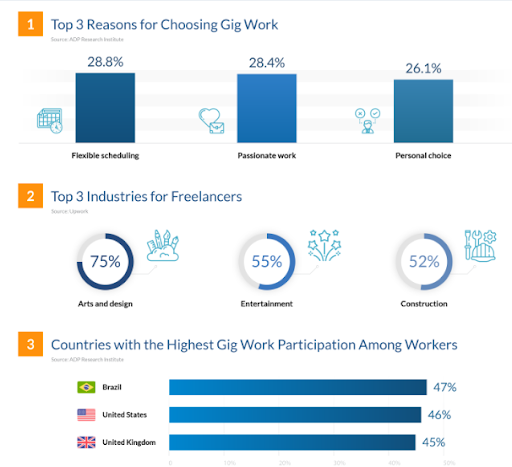
Source: Finance Online
You may find independent contractors and freelancers on these platforms who provide different services, such as graphic design, web development, content writing, digital marketing, and more. Based on their experience and project needs, clients can browse profiles, look through work portfolios, and engage freelancers. For organizations to access specialized talent for brief projects, freelance platforms also handle payment processing, contracts, and occasionally dispute resolution.
- Upwork
- Fiverr
- Freelancer.com
- Toptal
- LinkedIn ProFinder
→ Scheduling and Reservation Platforms
Did you know that online scheduling leads to 26% more new customers? Scheduling and reservation platforms are made to make it easier to schedule and reserve services or lodging. These markets are often used in sectors like tourism, hospitality, and personal services.
For instance, in the tourism industry, websites like Airbnb and Booking.com let customers search for and book accommodations like hotels, bed-and-breakfasts, and vacation rentals. Platforms like OpenTable assist customers in making restaurant reservations in the personal services sector, while others like Mindbody concentrate on scheduling fitness classes or spa visits.
These platforms frequently provide such features as real-time availability, customer evaluations, and safe payment processing. They make it easier to schedule appointments or make reservations for several services, whether it’s a weekend getaway for two, a meal out, or a yoga session.
- Airbnb
- Acuity Scheduling
- Setmore
- Bookafy
- SimplyBook.me
3. Peer-to-Peer (P2P) Marketplaces
Peer-to-Peer (P2P) Marketplaces are online spaces where people can engage directly and trade resources, goods, and services. They encourage decentralized interactions by allowing users to share resources or sell services, frequently for financial gain or resource efficiency.
→ Sharing Economy Platforms
P2P marketplaces that let people share their underused goods or services with others in exchange for money are known as sharing economy platforms. These platforms make use of technology to make resource sharing easier, frequently on an ad hoc basis.
Examples include home-sharing websites like Airbnb, where homeowners rent out their properties to tourists, and ridesharing services like Uber and Lyft, where drivers sell rides to passengers.
As per the American Market Intelligence report, over 56% of millennials in Mexico prefer Airbnb apartments and homes over hotels.
Platforms for the sharing economy encourage waste reduction and effective resource use and allow people to profit from their skills or assets.
- Uber
- Lyft
- Airbnb
- Car2Go
- Zipcar
→ Marketplaces for Rentals and Trades
Marketplaces for rentals and trades are peer-to-peer (P2P) platforms where people may swap or rent goods rather than buy them altogether. Various items, including tools, sporting goods, clothing, and even vehicles, are available for users to lend or borrow. These markets promote sustainability by encouraging item reuse and lowering pointless consumption.
Platforms like ToolzDo, where consumers can rent tools, and ThredUP, a marketplace for used apparel, are two examples. Marketplaces for renting and exchanging items emphasize the ideas of the sharing economy while providing economical and environmentally beneficial alternatives to traditional ownership.
- Fat Llama
- Rent the Runway
- Tradesy
- Rent Not Buy
- Front Porch Forum
4. Vertical and Niche Marketplaces
Online marketplaces known as “vertical” or “niche” marketplaces cater to specific client interests or industry demands by specializing in particular categories of goods or services. These markets offer carefully curated collections, frequently highlighting unusual or hard-to-find products.
Focusing more narrowly, they develop customized user experiences for customers looking for specialized or niche goods and services, establishing communities of specialists and fans in those fields.
→ Specialized Product or Service Offerings
Vertical and niche marketplaces, which concentrate on providing a particular category of goods or services, offer specialized product or service offerings. These markets serve clients looking for specialized or distinctive products that might not be easily accessible on more general e-commerce platforms.
For instance, a specialized product marketplace might focus solely on handmade crafts, rare collectibles, or antique clothing. On the other hand, a specialized service marketplace might link customers with highly qualified experts in particular industries like legal services for startups or custom house remodeling. These marketplaces are exceptional at offering specialized experiences and supporting communities of enthusiasts or subject-matter experts.
- Amazon Handmade
- Specializ.com
- Zazzle
- Redbubble
- Fine Art America
→ Industry-Specific Marketplaces
Platforms devoted to specific sectors or industries are referred to as industry-specific marketplaces. They act as focal hubs for companies and experts working in a given industry, facilitating contacts and transactions within that sector.
For instance, platforms like Zillow or Realtor.com act as industry-specific markets for the real estate sector, where consumers can search for properties, connect with real estate agents, and obtain information about the industry.
Similar to how Doximity connects healthcare professionals, medical equipment markets are focused solely on purchasing medical equipment for healthcare facilities. Industry-specific marketplaces make networking, collaboration, and effective transactions possible within specialized sectors.
- Zillow
- Realtor.com
- Doximity
- Healthgrades
- Carvana
💡 Build a marketplace business model that engages customers and sellers from across the globe. Connect with our team today.
Now that we have a clear understanding of the different types of marketplace business models let’s explore why investing in a marketplace model can be a smart move. Whether you’re an entrepreneur looking to start a new venture or an investor seeking a profitable opportunity, understanding the benefits of a marketplace model can help you make an informed decision.
So, let’s dive in and explore some of the key reasons why investing in a marketplace model can be a lucrative and rewarding opportunity.
Reasons to Invest in Marketplace Business Models
Online marketplace business models have become a profitable investment for startups and small businesses. Whatever business model you may choose, you are assured to get great benefits from it.
Let’s look at the top benefits of investing in the online marketplaces.
| Benefits | Description |
|---|---|
| Access to a larger customer base | By utilizing the marketplace’s current user traffic and customer base, businesses can access a wider and more diverse client base. |
| Lower marketing costs | Due to the fact that the market largely handles marketing and client acquisition activities, businesses can lower their marketing expenses. |
| Reduced initial investment | Comparing the upfront costs of joining an existing marketplace versus developing and marketing a standalone e-commerce website, the former is frequently lower. |
| Faster market entry | By making use of the market’s infrastructure, technology, and user base, businesses can enter it fast. |
| Payment processing simplification | The processing of payments is often handled by marketplaces, which streamlines financial transactions for enterprises. |
| Global reach | Through the marketplace, businesses can contact customers domestically and internationally in addition to local markets. |
| Reduced risk | Since joining a marketplace enables businesses to test products or services with less financial exposure, it can be less risky than starting an independent venture. |
All the reasons above prove that investing in an online marketplace business model can be highly profitable for startups and small businesses. Not just the profits, but it also lowers the risks.
Ready to grow your brand in the marketplace industry? Here are the complete steps that will help you build a successful marketplace business model.
Steps to Build an Online Marketplace Business Model for Your Brand
How do you build an online marketplace that engages various sellers and buyers? Creating a multi-vendor platform is easy when you follow the proper steps. Below, we have explained the steps to help you create a thriving online marketplace.
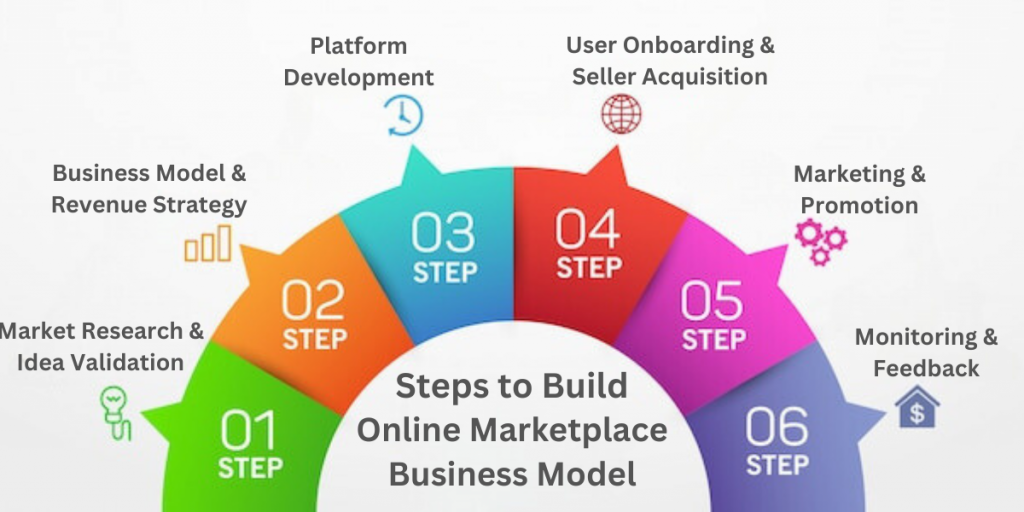
1. Market Research and Idea Validation
Thorough market research and idea validation are crucial throughout the earliest stages of creating an online marketplace. Find a sector or niche that has gaps and unexplored opportunities first. Because a thorough understanding of the market is essential, your decision should align with your experience and interests. Conduct a comprehensive market analysis to learn more about your possible rivals and market trends.
Analyze the current market participants’ advantages and disadvantages, demographics, and product gaps. Start a journey of surveys, interviews, or trial initiatives to validate your marketplace notion. By using these techniques, you can ensure that there is actual demand within the targeted niche from suppliers and customers.
Gather user feedback to understand better potential customers’ preferences, problems, and expectations.
2. Business Model and Revenue Strategy
The success of your online marketplace depends heavily on the choice of a solid business plan and a clear revenue strategy.
First, decide which marketplace model (such as B2C or C2C) best fits your concept and target market. This choice will influence the functions of sellers and buyers on your platform and how transactions go. Investigate developing a revenue strategy next. Decide on the revenue model for your marketplace, such as commissions, listing fees, membership programs, or advertising.
When creating your monetization strategy, ensure it is profitable, covers operational costs, and is competitive. Building trust with your users requires being open and honest about fees and charges.
3. Platform Development
Platform development is one of the most critical stages in creating an online marketplace. You must first choose a suitable development strategy. You have two options: use pre-existing marketplace software or platforms that provide ready-made solutions or develop your platform entirely from scratch, which offers complete customization but requires more time and resources.
Your project’s scope, budget, and timeframe should all be considered. The next choice you must make is the technological stack, which consists of the programming languages, frameworks, and tools that will power your market. Make decisions based on things like scalability, security, and the knowledge of your development team.
4. User Onboarding and Seller Acquisition
The onboarding of users and the recruitment of sellers are essential steps in creating a successful online marketplace. Building user confidence requires implementing user registration with identity verification.
This procedure minimizes the possibility of fraudulent conduct by assuring both buyers and sellers that they are dealing with trustworthy and legitimate peers. Making the registration procedure as easy as possible for users while ensuring the required security checks are in place is crucial. It boosts user confidence and improves their overall experience. Provide resources and tools to aid sellers in optimizing their profiles and listings to draw them in.
Provide advice on how to write compelling product descriptions, price plans, and stunning photos.
5. Marketing and Promotion
You must engage in marketing and promotion to make your online marketplace successful. A thorough marketing strategy must be created to start and expand your platform successfully. Adopt a multifaceted approach that incorporates influencer collaborations, partnerships, digital marketing, SEO, and content marketing. Digital marketing includes a range of media, including display advertising, email marketing, pay-per-click (PPC) campaigns, and social media advertising.
It enables you to reach potential customers where they are online and target particular demographics. SEO is crucial to maximize your platform’s visibility in search engines and make it simpler for visitors to find your marketplace.
6. Monitoring, Feedback, and Iteration
Keep track of user activity, transaction information, and engagement metrics to learn more about how people use your platform. Use tools and analytics to measure user happiness, conversion rates, and other essential performance indicators. Users should be encouraged to post reviews and ratings because they offer helpful feedback and contribute to community trust.
A positive user experience is fostered mainly by transparency and response to user feedback. The development and viability of your marketplace depend heavily on iterating and improving, depending on data and feedback. Analyze the data you’ve gathered frequently to spot problems, potential improvements, and innovative ideas. Utilize this data to improve user flows, hone current features, and improve the user experience as a whole.
For developing a solid marketplace business model, you need a team of professionals with years of experience. ValueAppz is one such name. We have helped various global clients enter the market with a robust platform. One such is Aagyo.
👉 Need a team to help you launch a solid marketplace model? ValueAppz is your one-stop solution. Connect Now.
How Did We Help Aagyo Develop an On Demand Delivery Marketplace?
One of our clients, Aagyo, needed a leading on demand delivery marketplace to attract buyers and sellers in its area. The brand delivers everything from food to vegetables, groceries, medicines, makeup, and fashion shopping.
Launched in 2021 in Uttarakhand, India, Aagyo has seen significant growth. It has delivered over 50,000 orders, and the app has an average rating of 4 stars. The client wished to build a digital solution to empower the locals in remote India, and that is the exact solution we provided.
- 10K+ app downloads
- 275+ vendors registered
- 16,500+ customer base
Check out our Aagyo marketplace case study to learn about the platform in detail.
Develop an Online Marketplace Model with ValueAppz
Not only do we have more than a decade of experience, but our cost-effective solutions make it easy for startups and entrepreneurs to launch their brands in just days.
Our marketplace app development services will help you develop a model that meets all your business goals and customer demands. Our readymade solutions are built for business people who quickly want to launch their brand.
We provide 100% customization, as we believe that everyone has different needs. So, connect with our team today to get started.
Key Takeaways
- The B2C marketplaces are expected to reach USD 3.5 trillion in sales by 2024.
- The major types of marketplace models include eCommerce marketplace, service marketplace, peer-to-peer marketplace, and vertical and niche marketplaces.
- Launching a marketplace model will give your business various benefits like access to a larger audience, lower marketing costs, faster market entry, quick payments, etc.
- The steps involved in building an online marketplace include market research, choosing the business model and revenue strategy, platform development, user onboarding and seller acquisition, marketing and promotion, and monitoring, feedback, and iteration.
Frequently Asked Questions
Q1. What are marketplace business models?
Marketplace business models are platforms that facilitate transactions between buyers and sellers while taking a commission or fee from service providers.
Q2. What are the 4 types of business models?
Four types of business models include eCommerce marketplaces, service marketplaces, peer-to-peer marketplaces, and vertical and niche marketplaces.
Q3. What are the 3 main types of online marketplaces?
The three main types of online marketplaces are B2C (Business to Consumer), C2C (Consumer to Consumer), and B2B (Business to Business).
Q4. How do I start a marketplace startup?
The steps to launch a marketplace are as follows:
- Market research and idea validation
- Business model and revenue strategy
- Platform development
- User onboarding and seller acquisition
- Marketing and promotion
- Monitoring, feedback, and iteration
Q5. How much does it cost to launch a marketplace?
The cost of launching an online marketplace depends on several factors, including the type of platform, features, etc. The average cost to build a marketplace ranges between $15,000 to $60,000.
THE AUTHOR
Harjyot kaur
As a technical content writer my focus is on creating high-quality, engaging, and informative content that simplifies complex technical topics. Throughout my career, I have continuously pursued opportunities for growth and development, refining my skills and expanding my knowledge base.

Get ready to digitally transform your business.
Let our team help take your business to the next level. Contact us today to get started on finding the perfect solutions for your business needs.





